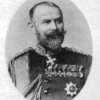The sanctions over Ethiopia were toothless, they were designed by the English not to be particularly hard, including oil,coal and steel would have Ethiopia was a full member of the league of nations, the lack of action on this was end of any chance of "collective security". The US was not party to sanctions and that enabled Italy to import what it wanted. The British do not see Italy as a greater threat , just more likely to take actions in areas sensitive to british interests. They didnt see Germny as a direct threat to England, just general europen peace, sucrity and stability. But no-one took the Italian army that seriously.
England and France DID try and persue a PRO-Italian policy but there were not willingly to go as far as Mussolini wanted. The allaince of Germany and Italy was a natural one based on shared attitudes and interests. There was some tension early on over spheres of influnce in south eastern europe including Austria. But once the Italians had a few reality checks about their real power and abilities (the strain of military operations in spain and africa) It would have taken extreme measures to stop these fairly natural allanice.
A strong anti-agression stance that supported the legue of nations would have brought Italy under immense strain very quickly. A naval blockade enforcing a real embargo (whatever the US choose to do) closing the suez would have left Italy with the choice of war or total humilation and baking down. Italy would have been beaten very very quickly in a war, just miantianing the blockade would have seen extreme economic pressure. With the sucess, confidence of such action the czechosovikian crisis could have been very different.
Mussolioni was a warmonger, he did seek conflict, spain, greece, albania, ethiopia!
The mistake was not taking firm collective action agianst agression.
links
http://www.nuffield.ox.ac.uk/economics/ ... 4paper.pdfhttp://www.zum.de/whkmla/sp/0910/hongko ... kong2.html








 All of those were prior to WW2.
All of those were prior to WW2.

















 - By grassroots1
- By grassroots1 - By Verv
- By Verv